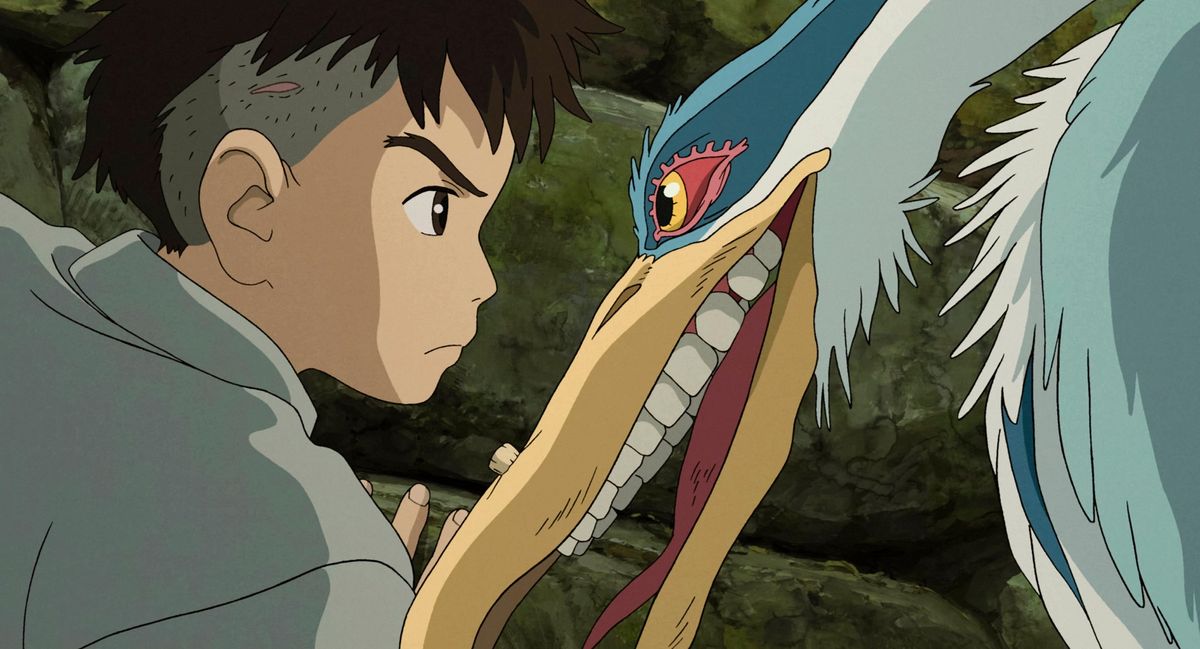‘The Boy and the Heron’ just landed on Max — here’s one thing I wish I’d known before watching it

I grew up on “Castle in the Sky,” “Kiki’s Delivery Service,” and the rest of Studio Ghibli’s impressive library of animated films. So when I heard the studio’s legendary director Hayao Miyazaki was coming out of retirement for one final film, “The Boy and the Heron,” you can bet my butt was in a theater seat on opening night.
It was an … interesting watch. Don’t get me wrong, it’s still every bit the stunning visual delight and poignant storytelling we’ve come to expect from Miyazaki. I can understand why it earned him his second Oscar for Best Animated Picture. But as someone who went in expecting the same sort of clear, if winding, throughline of Miyazaki’s previous works, I felt slightly dazed after leaving the theater, in a “What did I just watch?” kind of way.
Now that I’ve had time to chew over it, I feel like I’ve more fully digested its themes of grief, mortality, and the awe-inspiring yet delicate beauty of the world around us. I’m excited to watch it again now that “The Boy and the Heron” finally made its streaming debut on Max, mostly because I’ll be going into it with a realization I had halfway through my first viewing: This is an “Alice in Wonderland” style wild ride. Trust me, once you strap in for that, you’re going to have a much better viewing experience.
That expectation completely reframed how I engaged with the story. I only wish I’d known that going into it, as the awkward pacing and constant introduction of new and unresolved plot points left me with whiplash trying to wrap my head around what was happening. Now that I can watch “The Boy and the Heron” again on Max, I’m looking forward to embracing what seemed distracting and disjointed the first time around and seeing how that colors my opinion of the film. (Plus, I’ve yet to see the dub, and I heard Robert Pattinson absolutely killed it in his first voiceover role as the Heron.)
What is ‘The Boy and the Heron’ about?
Inspired in part by Miyazaki’s own life, “The Boy and the Heron” follows 11-year-old Mahito Maki (Luca Padovan), a young boy growing up in early 1940s wartime Japan. After his mother dies when the hospital she works at is bombed, he moves to the countryside with his father and new stepmother (Gemma Chan) — his late mother’s sister. His mother’s loss still weighs heavily on him, and he struggles to adjust to his new surroundings. One day, he crosses paths with a strange gray heron who leads him to a neglected corner of the property. There, he finds a sealed watchtower, the former home of his mother’s granduncle.
When Mahito’s stepmother suddenly goes missing, that’s the first place he looks. Along with the family’s maid Kiriko (Florence Pugh), he sets off to find her. The now-speaking heron (Robert Pattinson) lures him in with a watery imitation of his mother, and the three fall headfirst into a dreamlike world outside of space and time. Thus begins Mahito’s epic journey through a world full of magic, giant sea critters, and man-eating parakeets—with the heron, rendered powerless by an arrow, begrudgingly along for the ride.
‘The Boy and the Heron’ is even more ‘Alice in Wonderland’ than ‘Spirited Away’
Miyazaki is known for taking a slower pace through the fantastical worlds he creates, having mastered incorporating the Japanese concept of Ma (間)—or “a pause in time”—to foster a deeper, psychological experience in his films. Even still, his most well-known works like “Princess Mononoke,” “Ponyo,” and the aforementioned “Castle in the Sky” and “Kiki’s” follow a pretty clear three-act structure.
“Spirited Away,” the movie that won him his first Oscar, comes the closest to “The Boy and the Heron” in terms of pacing, but it makes its “Alice in Wonderland” style set-up plain as day from the get-go. “The Boy and the Heron,” on the other hand, spends most of the first half setting up what feels like a sinister mystery Mahito will need to unravel. The heron entices him with a cryptic promise that his mother is waiting for him in the tower while the elderly maids act suspiciously and seem to know more than they let on. Between the slower pace and overall tense atmosphere, I expected a completely different movie than what the second half actually delivered: a pure fantasy-driven adventure with classic elements of Miyazaki’s filmmaking style, including beautiful poster-paint backgrounds and adorable and horrifying creatures in equal measure.
More from Tom’s Guide
Source link

